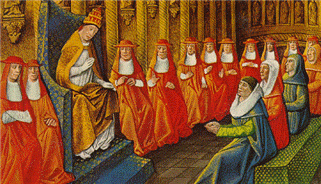IN THE COURT OF THE CRIMSON KING
- chapter index -
pg. 1 - Epitaph | pg. 2 - The Iron Gates of Fate
pg. 3 - The Fate of All Mankind | pg. 4 - Moonchild
pg. 5 - The Court of the Crimson King | pg. 6 - The Purple Piper
pg. 7 - Averroes | pg. 8 - The Keeper of the City Keys
pg. 9 - The Pilgrim's Door | pg. 10 - The Return of the Fire Witch
pg. 11 - The Gardener Plants An Evergreen | pg. 12 - The Prism Ship
pg. 13 - The Grinding Wheel | pg. 14 - On Soft Gray Mornings
pg. 15 - Divining Signs | pg. 16 - The Yellow Jester
pg. 17 - Remember the Future | pg. 18 - The Return of the King
pg. 19 - The I Ching | pg. 20 - Octants
site index
Translate from
"I run to grasp divining signs
To satisfy the hoax."
- A Few Quotes from The Three Impostors -
























 Arachnophilia
Arachnophilia